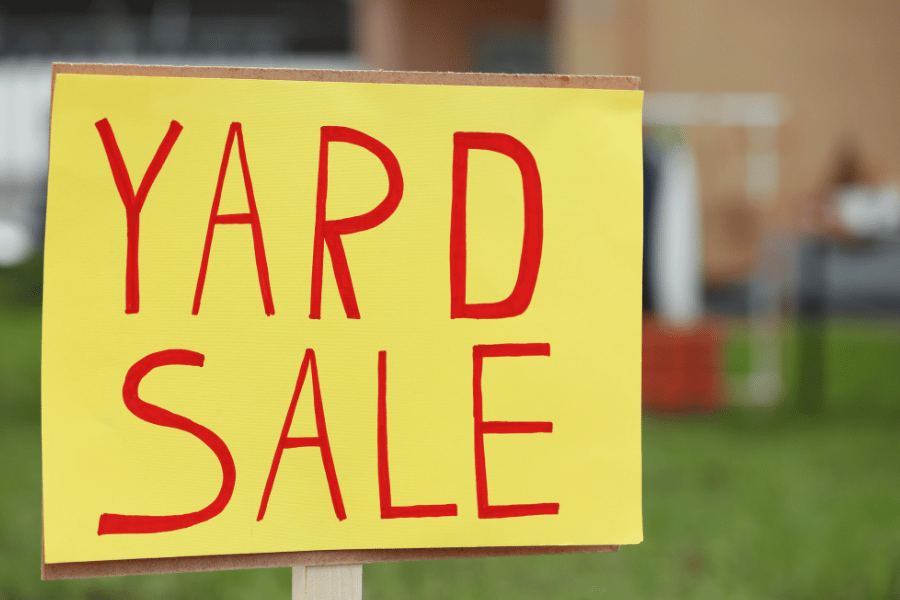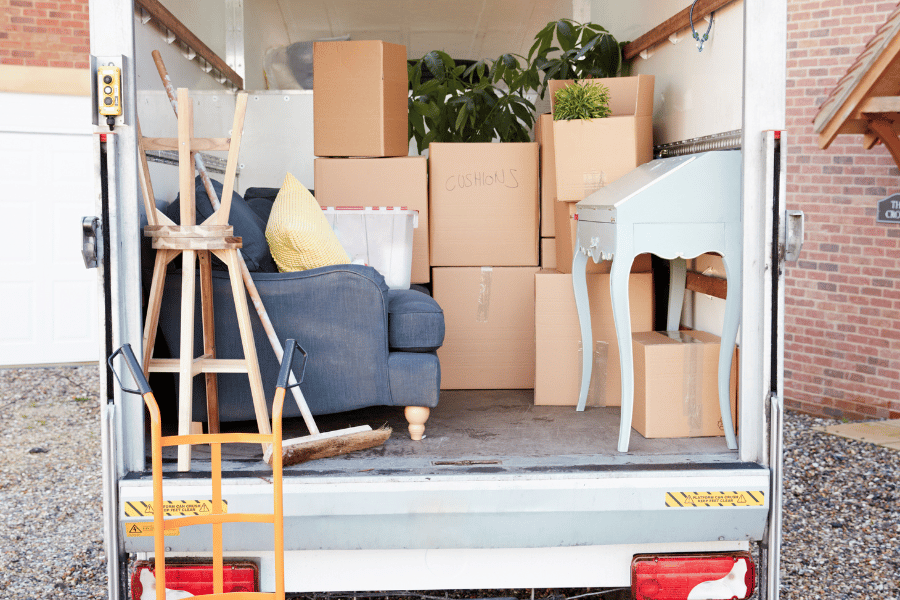How To Calculate Moving Costs

How To Calculate Moving Costs
Are you moving soon and want to learn how to calculate the moving costs? Here is everything you need to know about how to calculate moving costs after buying a new home.
Moving into your new home is exciting to look forward to but can be stressful and expensive. In order to avoid the stress, most homebuyers hire a professional moving company to assist with packing and moving.
Whether you are moving down the street or across the country, you'll find that moving costs can add up quickly. Hiring a moving company can be great to avoid the stress and time it takes to move, but it can also be more expensive.
Similar to when you started your house hunt, budgeting is essential to keep moving costs low. However, it can be hard to gauge how much money you'll need to save up to cover all the costs. Most homeowners aim to pay off all their moving costs before or shortly after moving so they can focus on their new home expenses.
In order to keep organized and save you cash, you'll need to know how to calculate moving costs. Whether you just bought your dream home or a home right out of college, follow this guide to learn how to calculate moving costs.
Keep reading to learn all about how to calculate moving costs as a homeowner.
Chapters
1. Average Moving Costs
Similar to most services, moving costs will vary greatly depending on the type of mover you choose. You'll have a couple of options when picking a moving company if you decide to use one.
There are full-service moving companies that will do the bulk of the work for you but at a higher cost. An average full-service move for a 3-bedroom home will cost approximately $2,100 for a local move and $5,500 for a long-distance move. On average, you can expect to pay somewhere between $400 and $1,000 extra for a packing service. In this case, you're paying for the movers to back up all of your belongings.
Your total moving budget will be based on the size of your move and distance. Typically, a local move will cost between $300 and $6,900.
If you want to save extra money and have the time, renting a moving truck will cost you between $20 and $100 per day. This is a great option if you don't have many items and are able to do the work yourself.
If you are relocating and moving long-distance, most companies base their prices on the number of miles and bedrooms. This can cost somewhere between $1,050 and $12,700, as movers need to factor in gas and time. In addition, if you don't want to drive out of state and choose to ship your car, this can cost between $550 and $2,450.
When searching for a company, make sure they are transparent about their pricing so you can find the best bang for your buck. It is advisable to factor in these moving costs when creating your home budget so you are not blindsided by the extra expenses when it comes time to move.

2. Create a Budget
Moving requires a lot of cost estimating, and creating an approximate budget will give you a better idea of how much to have. This way, you are prepared for any unexpected costs that may come about during the move. No matter the distance, you need to account for every expense.
The first step is determining how many items you will be taking to your new home. Take the time to inventory your belongings and figure out what you will be taking with you and what will be left behind. This will give you an estimation of what size moving truck you will need and the amount of packing supplies. To stay organized, list your belongings in categories by room.
Once you have your belongings organized, you can use it to estimate your moving costs. When creating your budget, ensure to include the following moving expenses:
- Moving Company
- Moving Truck
- Packing Supplies
- Travel Expenses
- Cleaning Fees
- Moving Insurance
- Storage Unit Rental
Make sure to factor in any specialty items that may be more expensive to transport. This would include breakables, collectibles, large furniture, and heat-sensitive items.
You can expect to pay movers between $40 and $80 per hour. Keep in mind that all of these expenses will vary greatly depending on the distance you are moving and whether or not you are using professional movers.

3. Determine If You Need Movers
The bulk of the cost of moving will come from hiring professional movers. As stated above, most movers charge based on the number of bedrooms and distance of the move. With over 8.4 million Americans moving homes per year, only about 22.7% hire a full-service professional moving company, according to Mercury Auto Transport.
The majority of homebuyers will hire professional movers if they are moving long distances, short on time, or want to avoid the physical and mental stress of moving everything on their own. In addition, you may need a professional mover if you have large specialty items that need to be handled with care.
There are over 18,000 professional moving companies in the country, meaning you have plenty of choices to find the most affordable company to hire.
It will all be up to your budget, the size of your move, and personal preferences. When it comes to picking a moving company, take inventory of your items and get a written estimate. Similar to picking a real estate agent, reach out to other homeowners you know and see what company they worked with.
Most moving companies will offer additional packing services, which can cost an additional $700 for full-service packing and unpacking. This is one of the best packing tips for an efficient move and will take a huge weight off your shoulders.

4. Common Moving Expenses
As you create your moving budget, you should include these common moving expenses depending on whether you hire a professional mover:
Moving Supplies
Many people underestimate the cost of moving supplies, such as boxes and packing tape. You may already have items like box cutters or extra boxes at home, but if you are moving by yourself, you may need bubble wrap, furniture pads, dollies, or moving blankets to ensure a swift move.
If you use a moving company with a packing service, these would most likely be included in the overall cost. But it is not always, so ensure you confirm with your company what is included in your package.
Moving Insurance
If you are a first-time home buyer or are moving out of an apartment, you may not know about moving insurance. This insurance will give you peace of mind through the moving process.
There are several different types of moving insurance, so you'll have to do your own research. None of these will be majorly expensive, but they are extra expenses. Moving insurance isn't required, but it is better to pay the small fee and keep your belongings protected.
Storage Unit Rental
Storage unit rental is also not essential when moving, but many home buyers keep some of their belongings in a storage unit while they are between homes. There are a wide variety of storage units available across the country, priced between $90 and $300 per month.
Cleaning Services
Most homebuyers prefer to hire a cleaning service for the old or new homes. If you have limited time to move out, a cleaning service is a great solution for getting your previous home cleaned by the new homeowners. On average, a cleaning company will cost between $25 to $80 an hour.

5. Ways To Save On Moving Costs
Many people cut down on moving costs by hosting a yard sale to get rid of excess items. Although this isn't necessary, it may help if you find that moving your items is too expensive. Consider decluttering as you pack things up as well.
Sell or Donate
The most common way to cut down on moving costs is to reduce the number of belongings you have. The majority of the time, homebuyers have several items where the cost of moving them outweighs their value. Not only will this help you cut down on costs, but you will have fewer things to keep track of and put away in your new home.
Book Travel Before Moving
Just like any road trip, booking hotels or flights may be cheaper if you handle it beforehand. Many online travel platforms offer lower rates for early bookings.
Move During the Offseason
According to USA Today, the peak moving season is between May and September. This is mainly because children are out of school, and it is easier for families with kids to move. Consider moving during the offseason for lower moving costs.

Methodology
We used information and data from several different sources, as well as our own data, to determine how to calculate moving costs. Most of the data was sourced from the following sources:
FAQ: How To Calculate Moving Costs
Here are some commonly asked questions about how to calculate moving costs.
How are moving charges calculated?
Most moving companies charge their clients based on the amount of hours it takes to get the job done. Local companies typically charge by the hour like this, and cross-country moves charge per mile.
What is a reasonable amount for moving expenses?
The average cost for professional movers is about $1,400, according to Forbes, with the majority being between $800 and $2,500. However, this can increase depending on the distance.
Can you negotiate moving costs?
You can negotiate moving costs if you are starting a new job by asking your new employer about the costs they will cover for your relocation. This will depend on your employer, the distance, and many other factors. Consider getting multiple quotes from different companies to find the best price.
What is the least expensive month to move?
Moving costs are usually the lowest between the months of September and April, so if you need to save extra money and avoid peak season, schedule your move during this time.
What is the least expensive day to move?
The best day of the week to move is during the weekday on Monday, Tuesday, Wednesday, or Thursday since moving companies are most busy on the weekends.
How To Calculate Moving Costs - The Bottom Line
Moving homes can seem like a daunting task, and after spending a lot of money buying a home, you will want a way to move without breaking the bank. If you are following moving trends, Conducting research and staying organized will be the best way to get through the move.
The key to not overpaying is knowing exactly how much square footage your possessions will take up. Consider creating an itemized list of your belongings, as most moving companies will require this, and it'll keep you organized for the move.
As you are searching for your next home in Raleigh, NC, which is one of the fastest-growing areas in the country with many beautiful homes for sale, you'll have to act fast if you want to buy your next home in one of Raleigh's best neighborhoods.
Before you buy your next home in the Triangle, feel free to contact one of our helpful real estate specialists, as they are eager to help you find the perfect home. We know that buying a home can be overwhelming, so make sure you are prepared beforehand.

Ryan Fitzgerald
Hi there! Nice to 'meet' you and thanks for visiting our Raleigh Real Estate Blog! My name is Ryan Fitzgerald, and I'm a REALTOR® in Raleigh-Durham, NC, the owner of Raleigh Realty. I work alongside some of the best Realtors in Raleigh. You can find more of my real estate content on Forbes, Wall Street Journal, U.S. News and more. Realtor Magazine named me a top 30 under 30 Realtor in the country (it was a long time ago haha). Any way, that's enough about me. I'd love to learn more about you if you'd like to connect with me on Facebook and Instagram or connect with our team at Raleigh Realty. Looking forward to connecting!
Related Blogs





